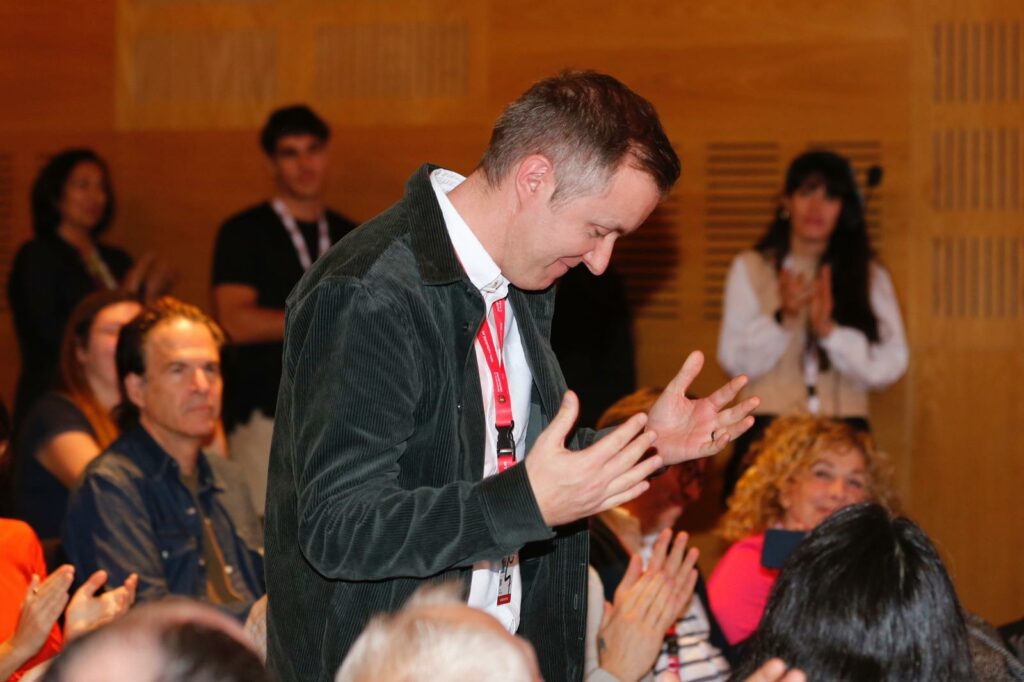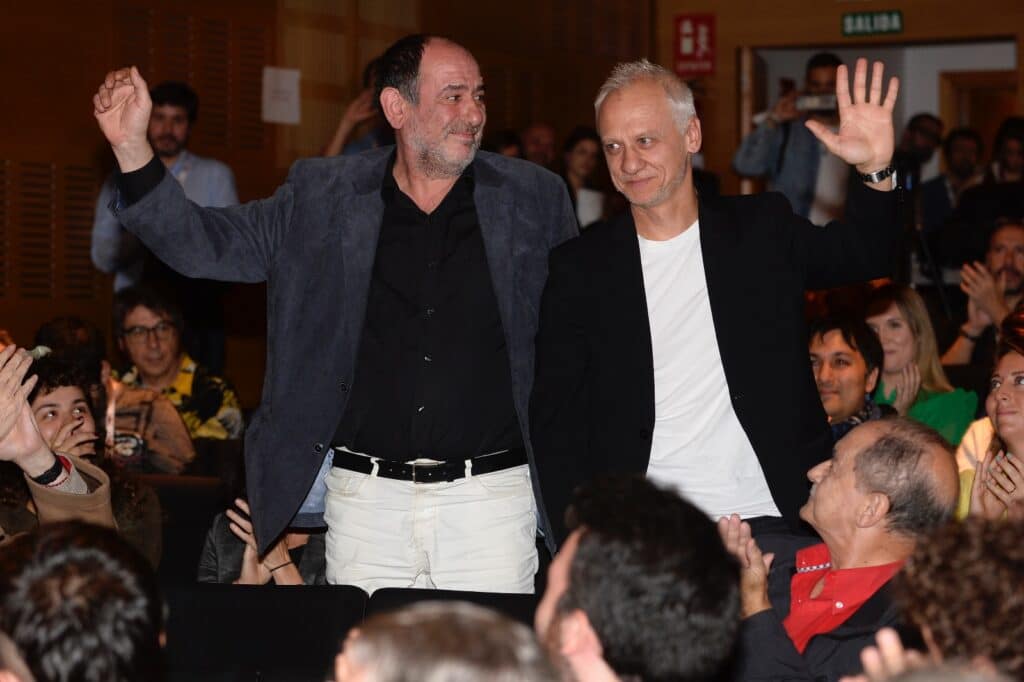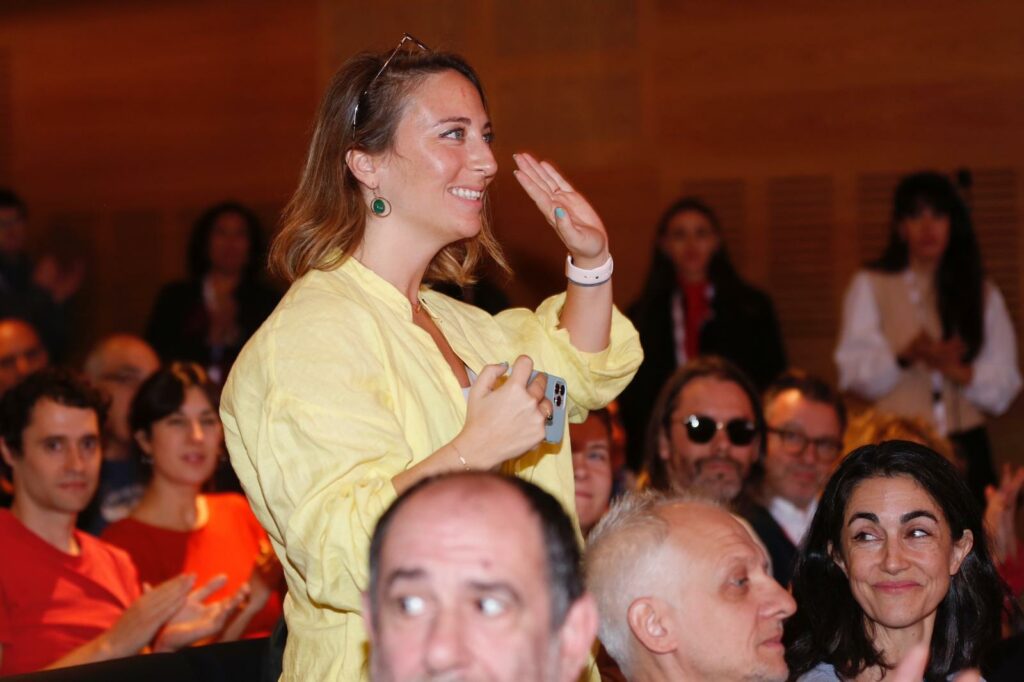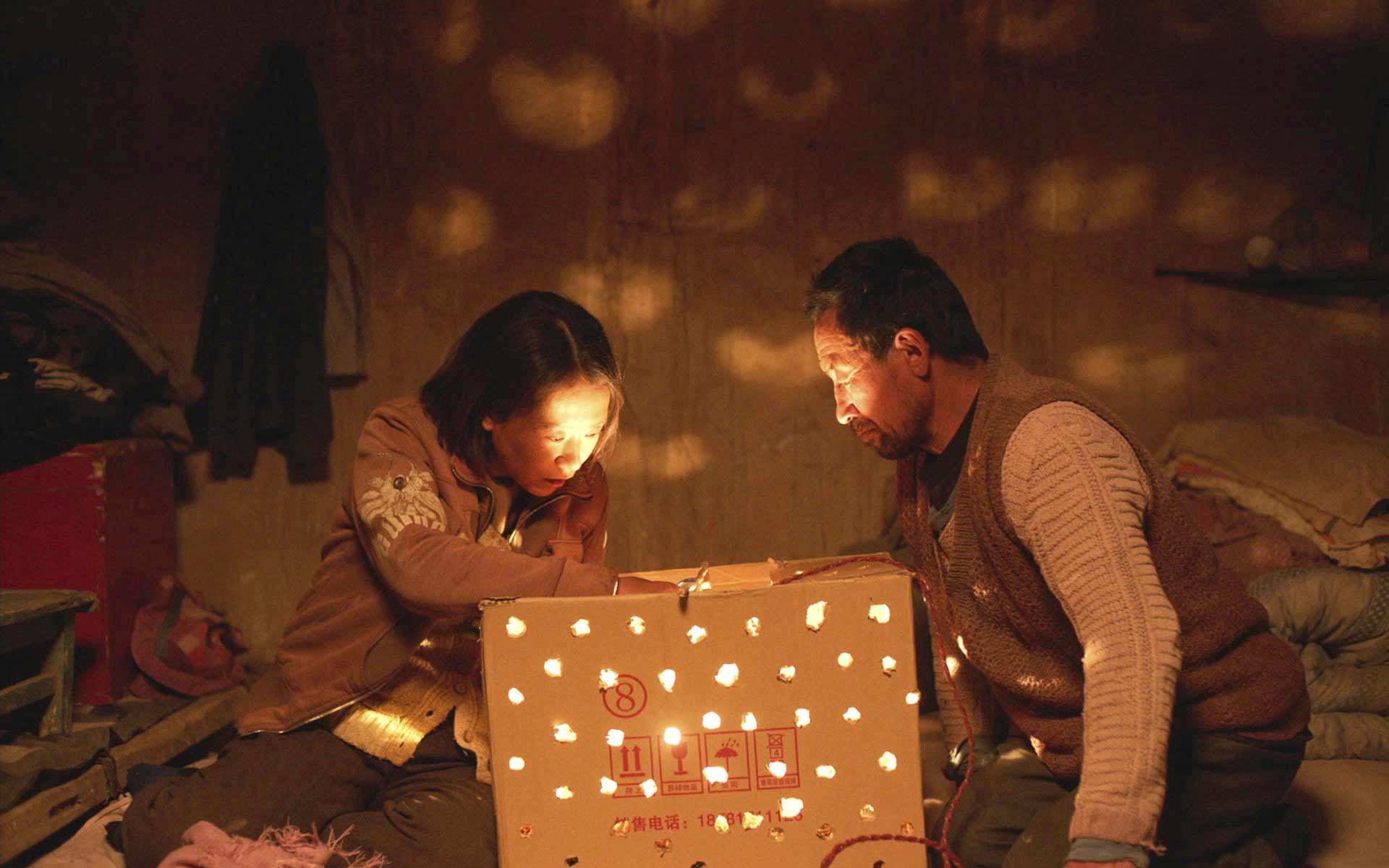- The Irish film The Quiet Girl, Colm Bairéad‘s debut feature, wins the Silver Spike, the Fipresci Award and the Audience Award.
- Ivan Barnev and Karra Elejalde both win the Best Male Performance Award for Vasil and Lubna Azabal the Best Female Performance Award for The Blue Caftan.
- Veteran filmmaker Jerzy Skolimowsk wins the Ribera del Duero Award for Best Director for EO, and Cristèle Alves Meira wins the Pilar Miró Award for Best New Director for Alma viva.
- The International Jury notes in its official minutes that it “has been astonished and gratified by the enthusiastic response to the excellent films chosen for this year’s Seminci”.
The Chinese film Return to dust, by the Chinese filmmaker Li Ruijun, has won the Golden Spike of the 67th International Film Festival of Valladolid. The jury, made up of Kate OToole, Jorge Arriagada, Pablo de Vita, Patricia Ferreria, Martín Hernández, Gracia Querejeta and Marie-Pierre Richard, considered the sixth feature film by the filmmaker, born in the province of Gansu (China) in 1983, about the humble and simple Ma and the shy Cao, expelled from their respective families and forced to enter into an arranged marriage, to be worthy of the festivals highest award.
In its assessment, the jury noted that it “found it difficult to describe this film because it covers a multiplicity of fundamental human questions. What does it mean to ‘have a place on earth’? The film is an ode to the idea of surviving with dignity and shows the importance of Nature in our lives and how we discriminate against the marginalised. Does it matter if we are nothing more than dust to dust?”
The Silver Spike went to the Irish production The quiet girl, by Colm Bairéad, a film that deals with the complexity of family ties through a girl who is sent to spend the summer with relatives. The jury awarded the prize “for dealing with a very difficult subject without mentioning it directly, in a very subtle and refined way, and for representing one of the themes that was most present in the films during the festival, that of nurture and care”. Colm Bairéad‘s debut feature film has also won the Fipresci International Critics’ Prize (made up of Esteve Soler, Jean-Max Méjean and Tonci Valentic) and the Audience Award.
The international jury awarded the Ribera del Duero Award for Best Director to Jerzy Skolimowsk for EO, a vision of the world through the eyes of an animal, while the Pilar Miró Award went to Portuguese filmmaker Cristèle Alves Meira‘s Alma Viva for “having the power to affect the audience with humour and love for humanity even if it is far from perfect”.
In the acting section, actors Ivan Barnev and Karra Elejalde were recognised ex aequo with the Best Actor Award for their roles in Avelina Prat‘s Spanish-Bulgarian co-production Vasil, while the Best Actress Award went to Lubna Azabal for her work in Maryam Touzani’s Le Bleu du Caftan.
The Miguel Delibes Award for Best Screenplay went to Mikhaël Hers, Maud Ameline and Mariette Désert for the French production Les passagers de la nuit, directed by the former.
In the technical section, the Jury awarded the prize for Best Cinematography to Rubens Impens for his work on Le otto montagne, by Felix Van Groeningen and Charlotte Vandermeersch, and the José Salcedo Award for Best Editing to Kim Sang-bum for Decision to leave, by Park Chan-wook.

León Siminiani‘s short film Arquitectura emocional 1959 won the Golden Spike for Short Film and the EFA Short Film Nominee Valladolid 2023 Award. The Spanish director wanted to combine in this project two of his great passions: cinema and architecture, in a love story between two first-time university students who cross different obstacles guided by a common line based on architecture. León Siminiani thus wins two of the three awards for the short film format. The jury decided to award the Golden Spike to this work “for being an illustration of how to marry architecture with film and photography thanks to its multiple layers, and for being a perfect reflection of the History of Spain (from the late 1950s to the present day) through architecture”.
“For its sense of humour, poetry and commitment to global warming”, the Silver Spike for Short Film went to the Portuguese film Ice Merchants, by João Gonzalez, an endearing family animated story starring a father and son who parachute out of their frozen house every day to go to the village where they sell ice.
The jury stated in its official minutes that it was “astonished and gratified by the enthusiastic response to the excellent films chosen for this year’s Seminci (many thanks to the festival programmers for their work in choosing so many extraordinary films). Even at 8:30 on Monday morning the cinema was packed. The festival and the films are nothing without you, the audience. Thank you for coming, it is very important to support high quality cinema like the one Valladolid has been lucky enough to experience this week”.
Meeting point
The Award for Best Feature Film in the Punto de Encuentro section went ex aequo to Syk Pike (Sick of Myself), by Kristoffer Borgli (Norway, Sweden), and War Pony, by Gina Gammell and Riley Keough (United States). The Jury, formed by Miriam Allen, Rubén Ochandiano and Nayra Sanz Fuentes, has taken this decision for “being two sides of the same issue that challenges us and for portraying in a very different way, with brilliant humour and poetry, such an important conflict as the abuse and consequences of the privileges of the most favoured”.
Likewise, the Best Foreign Short Film Award went to O Homem do Lixo, by Laura Gonçalves, (Portugal) for being “a tender story about generosity and admiration for an anonymous hero. He collects, repairs and recycles other people’s waste and gives it to his family and friends, giving a second life to what we consider rubbish in our disposable society. A beautiful, warm and intimate animation”.
The jury of the Punto de Encuentro section has also awarded a special mention to the short film Happy New Year, Jim, by Andrea Gatopoulos, (Italy) because “through a simple dialogue and a very suggestive animation proposal, the director introduces us to the complex world of the metaverse and the affective relationships that are generated in it”. The La Noche del Corto Español award went to El porvenir, by Santiago Ráfales (Spain).
Time for History
The first prize in the Tiempo de Historia section, whose jury is made up of Pere Puigbert, Mohamed Saïd Ouma and Shoaib Sharifi, went to All that breathes, by Shaunak Sen (India, United States, United Kingdom) for “tackling the global problem of climate change in a poetic and emotive way, showing that humans and animals must adapt to survive”. The jury also awarded the prize for “its cinematography and organic approach to conveying the story, and for its lovable characters, whether human or animal”.
Meanwhile, Zaynê Akyol‘s Rojek (Canada) won the second prize in Time of History for being “a brave piece of filmmaking that tackles a difficult subject in a simple and creative way, for its clever use of pacing that allows the audience to contextualise and breathe, and for its ability to humanise protagonists who have a brutal stigma attached to them”.

For its part, La Mécanique des fluides, by Gala Hernández López, (France), won the award for best short film for “creatively telling a story about a global social problem in a way that everyone can relate to, in this current era of increasing digital dependency, and for weaving social commentary with personal thoughts”.
DOC. Spain and Castilla y León en Corto
The jury of the DOC.España section, made up of Teresa Laviana, Daniel Pérez Pamier and Miguel Zozaya, awarded the prize for best film to Hafreiat, by Alex Sardà (Spain, Jordan), for “its cinematographic sensitivity in the exploration of an intimate portrait”.
The Castilla y León en Corto Award at this 67th Seminci went to Plein Air, by Raúl Herrera, (Spain). The jury, made up of Alba Frechilla, Pablo García Sanz and Alberto Velasco, decided to award this prize for “the good use of the natural spaces of Castilla y León, its tempo and sensitivity, which offers a cinematographic experience far from conventionalism”.
Rainbow Herringbone and Green Herringbone
The Jury of the Rainbow Herringbone Award of the 67th International Film Week of Valladolid, composed of Javier Castán, Virginia Hernández, Eva Iglesias, Alberto Rey and Yolanda Rodríguez, has awarded the Rainbow Herringbone to the short film Warsha, by Dania Bdeir, (France, Lebanon), programmed in the Official Selection.
The jury of the Green Spike of the 67th Seminci, formed by Mónica Fernández-Aceytuno, Miguel Ángel Pérez Quintero and Rocío Sastre Viyuela, has awarded Delikado, by Karl Malakunas, (Australia, Hong Kong, United States, Philippines, United Kingdom) for “protecting those who defend the environment against the implacable machinery of the system. In addition, it portrays with naturalness and a well-crafted cinematographic narrative an environmental activism based on a commitment to solidarity with the community and the earth”.
The jury also awarded a special mention to Ice Merchants by João Gonzalez (Portugal, UK, France) for “its stylised and poetic animation, supported by a precise script, which effectively conveys a necessary environmental message without underlining it. It shows in an accurate way the effect of climate change on the fragility of life on earth, without forgetting to tell us that, despite everything, there is always hope”.
FUNDOS Award
All that breathes, by Shaunak Sen, (India, United States, United Kingdom), has won the FUNDOS Award in this edition, whose jury is made up of Leandro J. Martín, Raúl Melero, Angélica Tanarro, Adriana Ulibarri and Belén Viloria.

The Young Jury of the Official Selection of the 67th Seminci, composed of Laura de la Fuente Barajas, Mónica Molpeceres Sancho, Cecilia Tejero García and Victor Zataraín Fernández, has decided to award the Young Jury Prize to Berdreymi (Beautiful Beings), by Guðmundur Arnar Guðmundsson (Iceland, Denmark, Sweden, Netherlands, Czech Republic), for “depicting a lost generation trying to find itself in a hopeless world where friendship is the last thing to be lost, while employing interesting surrealistic elements”.
In turn, the Young Jury of the Tiempo de Historia section, made up of Inés Centeno Olea, Marta Triana García Caramazana, Adrián Lozano, Sergio Pereda García, Mateo Represa Ollacarizqueta and Yuly Vargas, has decided to award first prize to Palm Trees and Power Lines, by Jamie Dack, (United States) for “the director’s fantastic execution in portraying a dangerous and toxic emotional relationship through love”. They also awarded a special mention to Syk Pike (Sick of Myself), by Kristoffer Borgli.
Audience and Young Seminci Awards
The Audience Awards of the 67th Seminci, organised by the newspaper El Norte de Castilla, went to the films The Quiet Girl, by Colm Bairéad (Official Selection), with a coefficient of 4.62 points out of 5; Joyland, by Saim Sadiq, and The Sparrow, by Michael Kinirons (Punto de Encudentro), which tied with a coefficient of 4.54 points, and Afghan Dreamers, by David Greenwald (Tiempo de Historia), with a coefficient of 4.85 points out of 5.
Also, the feature film El universo de Óliver, by Alexis Morante, (Spain), has won the prize of the Seminci Joven section, awarded by the voting of the audience attending this section, made up of schoolchildren from the educational centres of Castilla y León. The film received a score of 4.29 out of 5.
Golden Blogos Award and PIC Award
The Jury of the Blogos de Oro de la Crítica Award, composed of Paco Casado, Verónica Dávila and Carlos Minondo, has decided to award the prize to the film Le Otto Montagne (The Eight Mountains), by Felix van Groeningen and Charlotte Vandermeerschn, for “the quality of the script that immerses us in a story based on friendship through the years, its evolution and those great locations. A film that shows the passage of time in a superb way, with complex characters and masterfully constructed twists and turns”.
Finally, the Jury of the association Periodistas Iberoamericanos De Cine (PIC), made up of Mónica Uriel, José Antonio Díaz and Mireia Quintana, decided to award the PIC Prize for Best Ibero-American Film to Félix Viscarret’s No mires a los ojos, from among the eight candidates competing for the trophy for “showing us the protagonist in different realities as a spectator in a thriller that successfully combines intrigue and curiosity”.



























![Logo Foro Cultural de Austria Madrid[1]](https://www.seminci.com/wp-content/uploads/2024/09/Logo-Foro-Cultural-de-Austria-Madrid1-300x76.jpg)








